Fleetwood's last trawlerman laments the loss of an industry
- Published
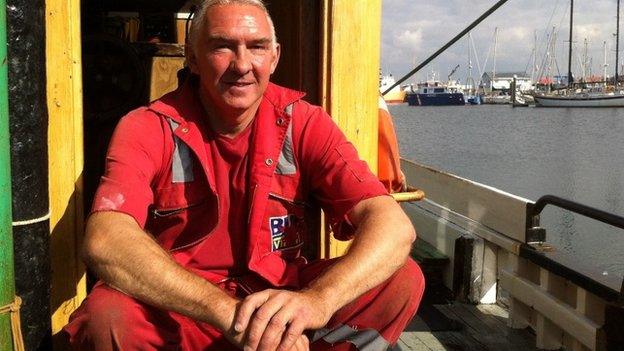
Gary Mitchinson, Fleetwood's last trawlerman, wonders if it is still worth fishing
Fleetwood was once synonymous with the fishing industry, but now Gary Mitchinson finds himself as the Lancashire town's last trawlerman.
"Never in a million years would I have believed it. I sit here many a day shaking my head and asking, 'What happened?'''
Mr Mitchinson is standing on the deck of his 40ft (12m) trawler Albion, which is moored on the dockside at Fleetwood, surveying the empty horizon; a horizon once dotted with masts and funnels from the port's heyday as the third-largest in the country.
In the 1950s and 60s the town boasted about 120 trawlers. Fishing employed 11,000 people directly and - indirectly - a third of the population.
Mr Mitchinson is now readying the engine of his 60-year old vessel for another trip out, a trip into the unknown. Will he catch enough fish to cover his fuel, insurance and other costs?
"It's getting to the point now where I ask myself if it's worth the effort," he says.
"If I could leave for the right on-shore job tomorrow, I probably would. It's a big decision to make.
"I was one of the youngest in the job, now I'm one of the last. But it's in the blood, it's hard to let go."
'A thousand yards'
His story mirrors the decline of Fleetwood's fortunes.
The fish processed and sold at the early morning dock market now - alongside his catches - comes in by road from other ports. But processing still employs 600 people and plans for a new "Fish Park" could create more vital employment.
This will be another fish processing centre on a nearby dock site, which is currently empty. Government funding is in place to make this happen.
John Wilson is one of two brothers running family business Jack Wright, one of the big processing firms on the docks.
"Once upon a time, we had a thousand yards of the market filled with fish being sold," he says. "Now it's more like one hundred."
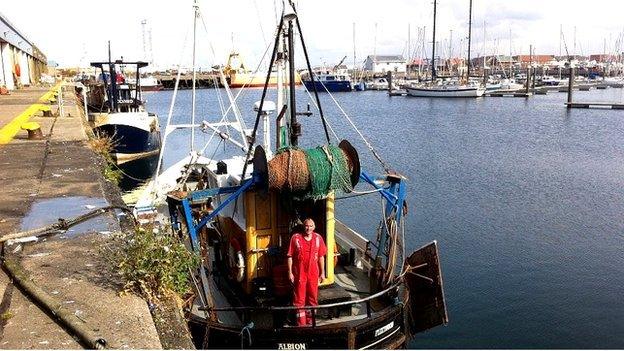
Albion is Fleetwood's last working trawler
Lionel Marr, whose family owned and operated many of the port's trawlers, recalls: "It was once possible to walk the length of the main dock across the bows of the boats, there were so many moored side-by-side."
Now he is a trustee of "Jacinta", Fleetwood's heritage trawler, moored behind Freeport shopping centre as a living museum.
The history of fishing in Fleetwood is told at the town's museum which features "The Harriet", a former fishing boat stored in a giant warehouse.
Historian Dick Gillingham, who works there, cites two main factors in the town's demise.
"The 'cod wars' of the 1970s, when Iceland restricted how much fish could be caught in its waters, were really the death knell," he says.
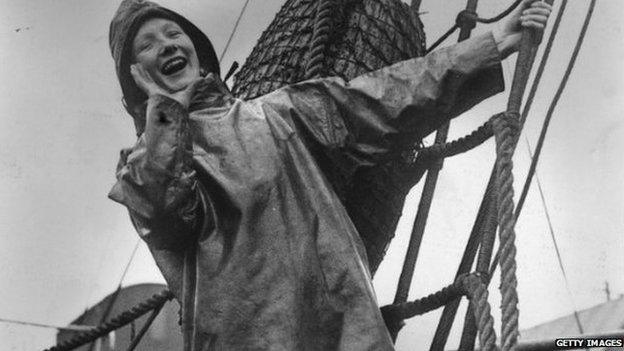
A third of Fleetwood's population were employed in the fishing industry in its heyday
"Then in the 1990s many fishermen sold their boats off under a government decommissioning scheme to preserve fish stocks. And that was the end of the industry here."
Mr Mitchinson followed his father into trawling and is one of the last vestiges of that industry, along with his one crew-mate, but he admits he's very close to ending that family line.
"You can't live off fresh air at the end of the day. You need money to live, and that's it."
'Three-day millionaires'
Money was in plentiful supply in the glory days. The fishermen returning to port after three weeks out at sea would collect bulging wage packets.
"They were known as 'three-day millionaires'," said Phil Thomas, who spent 30 years on the boats.
"They'd have more money than they could spend and the town was buzzing. But they were the most generous, kind-hearted men you could imagine. They might be walking down Dock Street, drunk as a fool, and they'd give you their last penny.
"I'm proud to have been a part of that. It can bring a tear to your eye."
Talking of being drunk, Leon Flaherty sheepishly confesses to the time he came back to port, went straight to the British Legion club, sank one too many and missed the birth of one of his children.
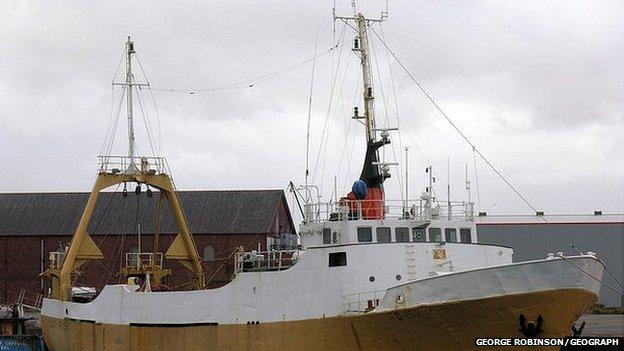
Jacinta, Fleetwood's last deep-water trawler, is now a heritage item
"I was so inebriated I had to get a friend to ring the hospital! Norah, my wife, wasn't supposed to have the baby then."
"Have I forgiven him?" said Norah with a wry smile. "Well it was 42 years ago, so I suppose so!"
Norah was one of the "women left behind" when their menfolk went to sea. They had to be father as well as mother to their children, and often go to work as well to make ends meet.
Their stories are told in song by local folk duo Sue Bousfield and Liz Moore, who have performed for 40 years as Scolds Bridle.
"The women had to be so strong," Ms Bousfield said "and they developed a very proud sense of sisterhood."
That strength was needed when tragedy struck and vessels were lost at sea. One of the songs the duo perform is called "Lost" and simply lists the names of the 44 boats which never returned.
Two tributes on the seafront recognise those aspects of Fleetwood's unique fishing history.
Welcome Home is a statue of a mother holding a baby, beside a young child, gazing out across the ocean with hope and concern.
The other, a sculpture called Out To Sea, has a plaque which begins with the inscription: "Past this place, the fishermen of Fleetwood have sailed for generations while their families have watched from the shore. Their courage and comradeship under hardship is a living legend."
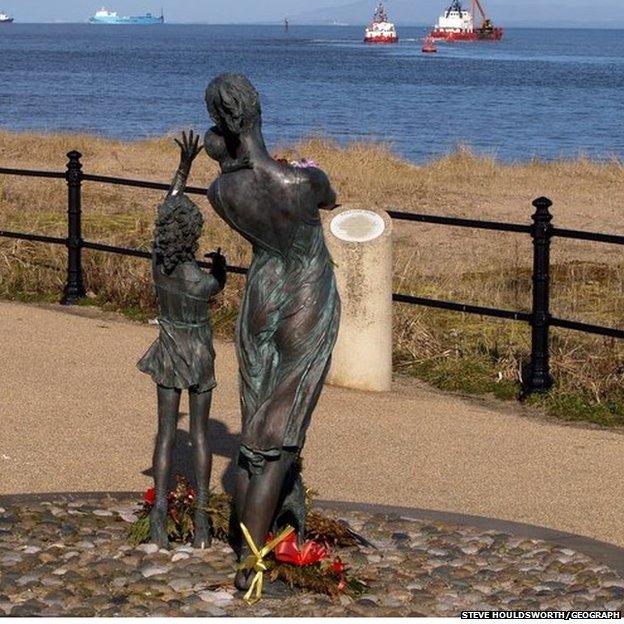
Fleetwood's fishing industry is passing into history